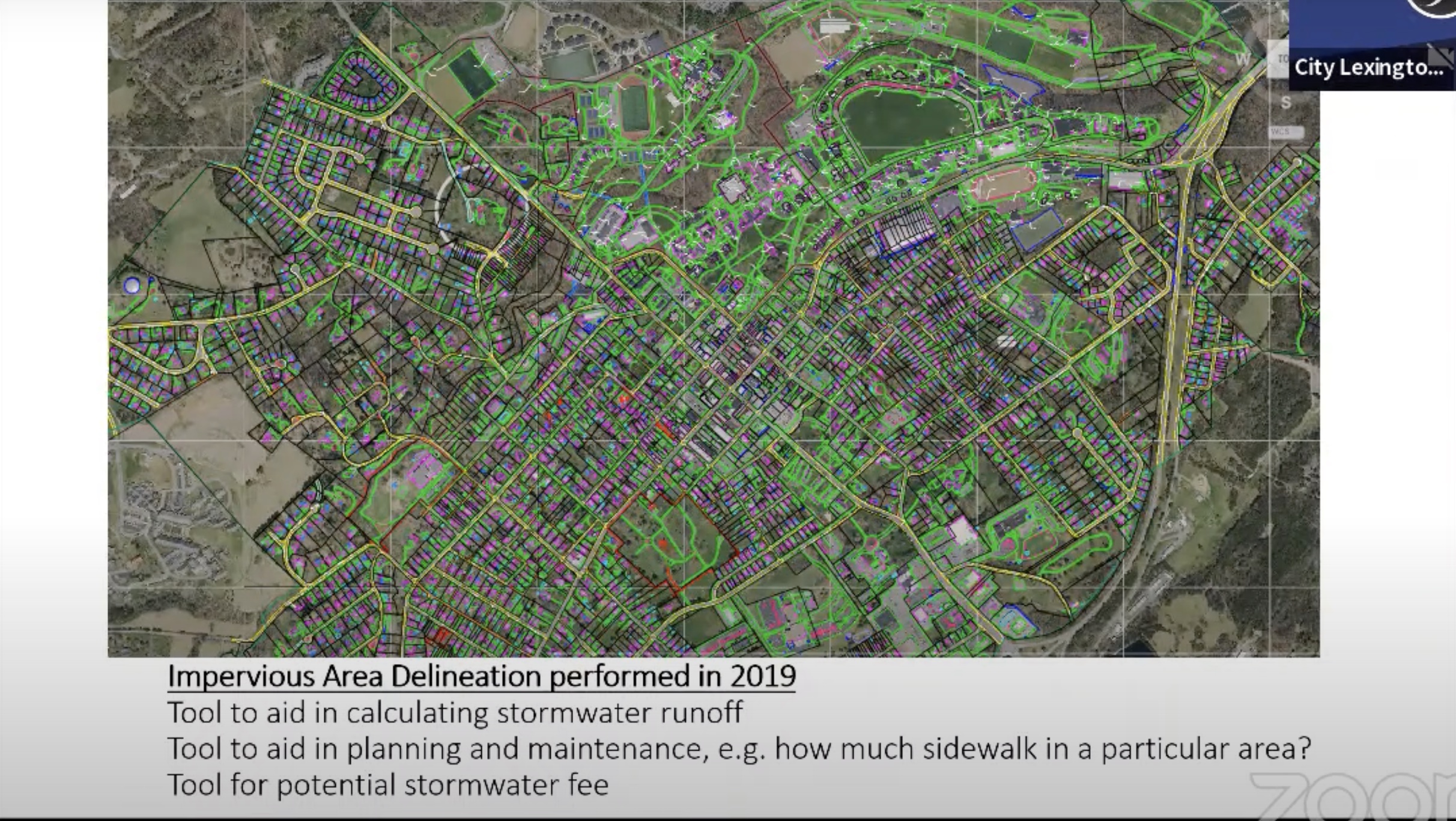By Ruby Gregg
Lexington City Council is considering implementing a monthly stormwater fee for all property owners—including churches and universities—to cover the environmental consequences that occur after a soaking rain.
When it rains, debris, such as cigarette butts, car antifreeze and oil, flow down hills and streets and into the Maury River, eventually reaching the Chesapeake Bay, City Manager Jim Halasz said in an interview.
“People have become more and more aware about the impact of stormwater on your rivers,” he said. “The stuff that washes off the street really isn’t good to be in the rivers.”
There’s also the impact on homes and yards that are inundated with water because of poor drainage.
“It causes minimal damage,” Halasz said. “But if it’s your basement and your floors, it seems a lot more than minimal.”
The fee would likely range from $1.05 to $6.00 per 500 square feet. No rate has been set yet, Halasz said.
City officials estimate the stormwater fee would generate $500,000 to $700,000 per year.
The monthly fee would cover the costs of the city’s stormwater projects, some of which are being delayed while council considers the proposed funding mechanism.
About the two projects
Two projects—one on Diamond Street and the other on White Street—are designed to collect rainwater and re-route it to minimize damage.
Diamond Hill’s stormwater maintenance is projected to cost $800,000. White Street’s project is estimated at about $112,000.
Over the past couple of years, the city spent $1.1 million on stormwater drainage improvements on Lime Kiln Road, Enfield Road and East Nelson Street.
“We have a number of hills and a number of low spots in the community,” Halasz said. “Diamond Street is going to be a bigger project because you have, relatively speaking, [a] higher and longer hill, and water stays concentrated in those curves. That gets to be expensive.”
Halasz said stormwater runoff has flooded neighborhoods and other areas of the city.
“Most of the issues we have is because of water going downhill very fast to people’s driveways,” he said. “Then it spills over when it gets to a certain depth or velocity into people’s yards.”
The stormwater fee would be included on monthly water bills, Halasz wrote in materials provided to council in advance of its April 4 meeting.
“With an established Stormwater Program/Utility, funding will be available to permit the City to pay for the projects that are needed and better protect properties within the city, and better protect our environment,” he wrote.
Right now, funding for stormwater projects comes out of the city’s general fund. The general fund is supported by real estate and property taxes, other tax dollars and parking fees, Finance Director Jennifer Bell said.
If council approves the proposal, the stormwater fee will generate the funding that’s needed to pay for projects like Diamond Street and White Street, Bell said.
Council conducted a study for a stormwater fee in 2019, Halasz said.
“The study mapped the city,” he said. “Every parking lot, every rooftop, every road…with approximate square feet of these areas. You could tell how many square feet you would have if you wanted to put a fee in place.”
More about the fee
Patrick Madigan, director of public works, said the rate range is based on what other cities are charging. Nearby cities that already have a stormwater fee include Harrisonburg, Charlottesville, Roanoke and Staunton.
The fee is calculated by the size of what are called “impervious surfaces.” They are roofs, sidewalks, patios and driveways that do not permit water to seep into the soil.
“There’s a community responsibility to continue putting curb and guttering and stormwater piping throughout the city where it doesn’t exist,” Madigan said.
Bell said the city would gradually introduce the fee over a period of several years. She said the approach would accommodate the city’s larger properties, like its two universities, who will be billed higher fees than smaller households.
“It’ll give them a couple years to sort of build it into their budget,” she said.
Steve McAllister, Washington and Lee University’s treasurer and vice president of finance, said he agrees with Halasz’s proposal to create a stormwater fee and fund.
“I fully understand what he is trying to accomplish,” McAllister said in an interview.
He said he doesn’t think the fee will create a burden for W&L.
But he said he wants to talk to city council about giving the university credit for steps it has already taken to mitigate stormwater runoff.
“We’ve got a good relationship with the city, so we’ll certainly work with them to talk through structures that I think all parties will find fair in the end,” McAllister said.
Looking ahead
Halasz said the council will discuss the proposed fee again at its next meeting on June 6.
The city manager said he hopes Lexington residents will support the fee.
“If most of us say, yeah we want our rivers, our lakes and the bay cleaner,” Halasz said. “It’s going to cost something.”

